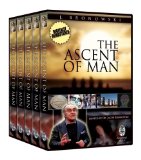| Reviews & Columns |
|
Reviews DVD TV on DVD Blu-ray 4K UHD International DVDs In Theaters Reviews by Studio Video Games Features Collector Series DVDs Easter Egg Database Interviews DVD Talk Radio Feature Articles Columns Anime Talk DVD Savant Horror DVDs The M.O.D. Squad Art House HD Talk Silent DVD
|
DVD Talk Forum |
|
|
| Resources |
|
DVD Price Search Customer Service #'s RCE Info Links |
|
Columns
|
|
|
Ascent of Man, The
Ambrose Video // G // March 1, 2007
List Price: $149.99 [Buy now and save at Amazon]
The Series:
In 1969 the BBC broadcast one of its first color documentaries, Civilization. Written and presented by art historian Kenneth Clark, this 13-part series looked at the great works of European culture starting in the Dark Ages, and advanced the theory (among others) that art was a significant force in driving civilization forward. Polish-born mathematician Jacob Bronowski disagreed and thought it was science that advanced humanity and civilization. As a counterpoint to
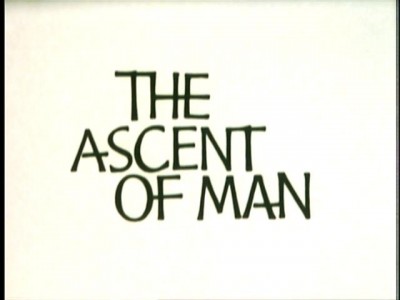
Originally shown on BBC2 in 1973, this influential series (it inspired Carl Sagan to create Cosmos) is available on DVD through Ambrose Video, a firm that mainly markets to schools and libraries. Though the set is rather costly, this is an important and interesting show that is worth the price.
Unlike many documentaries of the time, The Ascent of Man does not take a strict chronological look at its subject. Though the series does start with the evolution of man and examines various pre-human species, Bronowski follows threads of discovery, tracing the affect of one invention on society and seeing what comes from that. It's a method that will be perfected years later with James Burke's Connections, and it serves Bronowski well in this show.
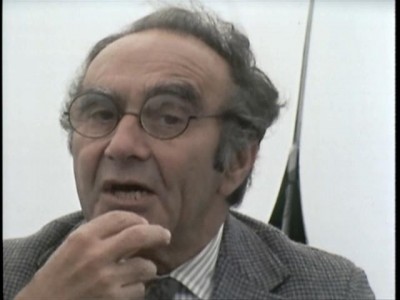
One of the most impressive aspects of this show, and what makes it stand out so much when compared to other documentaries, is that the show does not take a solely Eurocentric view on advances. Bronowski gives a lot of credit to Eastern innovations, gunpowder, the loom, and steel to name a few, and even discusses how and why Europe developed in different ways than
One of the more interesting episodes deals with metallurgy; the use of natural copper found in its metallic state to the discovery that certain rocks could be melted to obtain copper. From there he discusses the problems with copper, that it won't keep an edge and is very soft, to the counter-intuitive process of adding another soft metal, tin, to copper in order to make a stronger alloy, bronze.
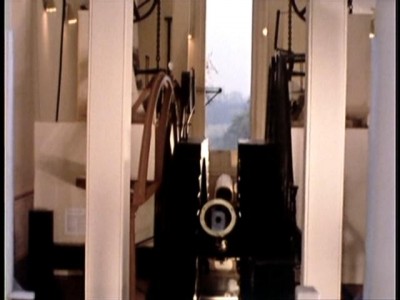
He moves to
The show does deal with a lot of science, but it's never overly intellectual or above the average layman's head. Bronowski uses simple examples and explanations for the various scientific principles that he's discussing and never gets too technical or obtuse. My kids screened several episodes with me and they were never lost or confused.
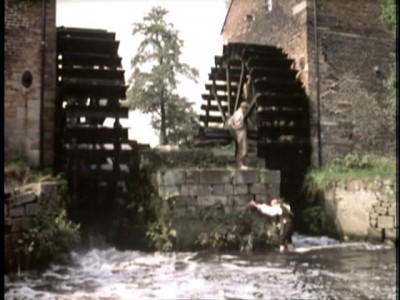
The DVD:
The series comes on five DVDs, each with its own keepcase, that are housed in a thin pressboard slipcase.
The one irritating aspect of this set is that it takes a long time to get to the actual menu page. Before that there is a long intro that can't be bypassed. It lasts nearly 50 seconds and is played every time the disc is inserted into a player.
On the positive side, as far as I can tell, these are the full, uncut episodes. When the show was replayed in
Audio:
The two-channel mono soundtrack is adequate but not outstanding. This was released in 1973, and recording technology has come a long way since then. The range isn't fantastic and the dialog isn't always as crisp as it should be. Bronowski has an accent which I believe is Polish, and sometimes it's hard to make out a phrase or two. Luckily there are optional subtitles for such situations.
Video:
This show was shot on 16mm film in 1973 by the BBC and this set looks like other British shows from that era. The colors in the full frame image are fairly muted and not nearly as vivid as one would hope. The blacks aren't as solid as they could be either. There is some damage to the prints too, dirt and a few scratches which are most noticeable at the beginnings of the episodes. Aside from that the picture has a good amount of detail, though it is soft in places. Compression artifacts are fairly rare, some minor aliasing and a little banding here and there but nothing significant. When all is said and done this is an average looking set, a solid, unrestored presentation that is very watchable.
Extras:
Unfortunately there are no extras. Given that this set is aimed at schools and libraries, that's understandable, but I would have loved it if they included the introductions that the late Douglas Adams recorded for the show when it was rebroadcast in
Final Thoughts:
A very important and influential documentary series, The Ascent of Man is both entertaining and enlightening. Though the set is a little pricey, it's great that Ambrose Video has released the program here in the
|
| Popular Reviews |
| Sponsored Links |
|
|
| Sponsored Links |
|
|
| Release List | Reviews | Shop | Newsletter | Forum | DVD Giveaways | Blu-Ray | Advertise |
|
Copyright 2024 DVDTalk.com All Rights Reserved. Legal Info, Privacy Policy, Terms of Use,
Manage Preferences,
Your Privacy Choices | |||||||









